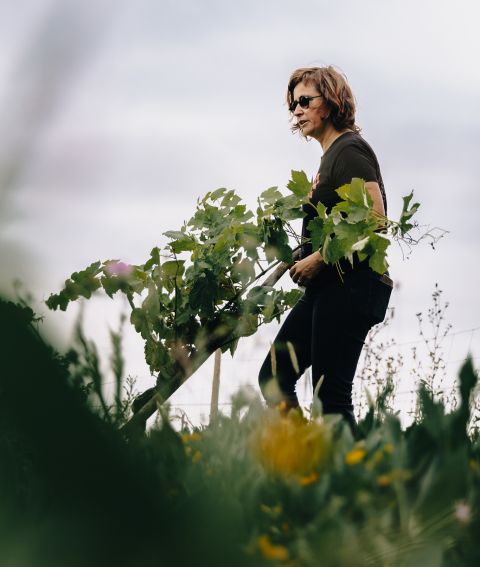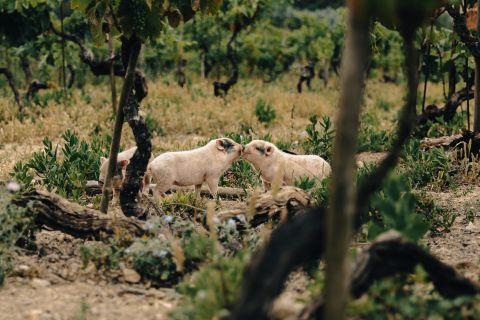Normally I leave the Portuguese wines to Julia Harding MW, our resident Portuguese-wine expert. But this wine is so outrageously good for the price that I asked her permission to feature it this week. She was so enthusiastic in response that I knew I’d picked a good one.
Of course, there’s no dearth of wine bargains in Portugal, especially from regions such as Bairrada, an often overlooked expanse of land between the port-producing Douro to the north and Coimbra, ‘the Cambridge of Portugal’, to the south. (See the World Atlas of Wine map here.) But even among all the jewels the country puts out at amazingly low prices, this white wine shines. It tastes in fact like liquid minerals, lean, clean, sparkly and saline, like light glinting off flakes of fleur de sel, if that light had a flavour. And as lean and light as it is – it's only 11.5% alcohol – it's entirely satisfying, mouth-filling despite its near-weightlessness, deep and complex despite its transparency.
Reader, I finished the bottle and immediately bought another one. Not in the same night (though it was tempting). But this is the sort of wine you’ll want to buy by the case.
What is it? It’s a blend of the local varieties Arinto and Bical, but the more important bit is the back story. This comes from Filipa Pato, who’s basically the Queen of Bairrada, having learned her craft from her father Luís Pato, known as Mr Baga, or the King of Bairrada. The moustachioed Luís began championing Baga back in the 1980s, when Bairrada’s winemaking landscape was dominated by large companies and co-operatives and Baga was known to take the skin off your teeth and glue your mouth shut with its tannins. He proved that it just needed more care and attention, and that it was better to devote time to Bairrada’s old vineyards and indigenous varieties than to plant international varieties as ameliorants.
Filipa grew up in those vineyards, and, after winemaking stints in Bordeaux, Mendoza and Australia’s Margaret River, started to make her own wines in 2001. As her husband, Belgian ex-chef and champion sommelier William Wouters, wrote to me this week while Pato was in the vines harvesting, ‘Filipa started her own project, buying grapes from different plots in Bairrada and taking care of some rented vineyards. All this to try to understand better the different terroirs. She had at that time already a different view on Bairrada and its grapes and the way to work in the vineyards than her father. She started immediately banning pesticides and herbicides and [took] a biodynamic approach of working in the vineyards.’
Today they farm 20 ha (49 acres) divided among 36 plots mainly in two villages (‘our Puligny-Montrachet and Chambolle-Musigny’ Wouters writes, adding a winking emoji). Small pigs roam the old-vine vineyards, helping keep the weeds down and the soil fertile. (They used to use sheep, but found that, come March, they ate the vines, too.) Today they are one of only two wine estates in Portugal certified biodynamic by Demeter (the other is Quinta da Palmirinha far to the north, in Vinho Verde). While it’s hard to be strictly organic when your plots are dotted among conventionally farmed parcels, Wouters says they’ve made ‘friendly fences’ with local bushes (strawberry trees and hawthorn). The subtle approach has paid off, as some of their neighbours are now also converting their vineyards to organic farming. As Wouters says, ‘Diplomacy is the key.’
Pato and Wouters focus expressly on native varieties presented without make-up – in fact the wines are proudly labelled ‘Vinhos Auténticos Sem Maquihagem’ (authentic wines without make-up). ‘We dedicate a lot of time in improving our viticulture, creating more biodiversity, working with our animals and analysing the wide variety of local plants’, Wouters explains. ‘If you have good fruit you don’t have to look for abracadabra.’
That’s a sentiment telegraphed in the wine’s name, a contraction of ‘Dinâmica’, which Wouters explained to Julia when she reviewed the duo’s Baga, the red companion to this white: ‘The idea behind the name of Dinâmica is to show that Bairrada still has a very present polycultural environment (olive trees, fig trees, pine trees, etc) which attracts lots of wild animals and auxiliary insects that protect the vines from diseases’.
This wine is 80% Bical and 20% Arinto from vineyards they are converting to biodynamics with some fruit from their neighbours, as supporting fellow winegrowers and fostering strong relationships with them is just as important for their own business as it is for the future of the region. It’s a curious blend as Bical ripens 2–3 weeks earlier than Arinto. So they vinify each variety separately, whole-cluster pressing and fermenting spontaneously (10% in 500-litre French oak barrels, the rest in tank), then leaving the wines on the lees without stirring until early spring. Then they blend.
But Wouters tells me they don’t mind the extra work to make the blend as they find the two varieties so complimentary. ‘Bical is very aromatic and has a lot of creaminess and Arinto a lot of tension and gives a nice dash of Atlantic breeze.’ He also adds that 2023 was an outstanding vintage in their region – ‘super balanced, healthy fruit and for once a good quantity, too.’ Unfortunately, 2024 is proving much more difficult, with mildew issues taking out 30% of their production. More reason to stock up on the 2023 …
Asked how they manage to deliver a wine that requires so much care and patience at such an affordable price, Wouters replies, ‘To be totally honest with you, we want our wines to be drunk and it is important to have your “entry level” at excellent value/money to be able to tease people for the rest of our portfolio. This is something that I learned in my former life as a restaurateur/sommelier: if the entry level wines are delivering… you should definitely look for more of this specific producer.’
I suppose it’s a slippery slope from here on in, but I’m all in.
Fortunately, their wines are widely distributed, with Skurnik Wine handling them in the US and Clark Foyster in the UK, and distribution in another 40-some markets.
Every Friday we provide you with a free recommendation for a particularly delicious, ready-to-drink wine that’s available on both sides of the pond and at a very good price. Members can find many more of Filipa Pato's wine in our tasting notes database. And everyone can read more about Pato and Wouter’s regenerative farming practices in Xeniya Volosnikova’s entry for our wine-writing competition in 2022.
Images of pigs and of Pato and Wouters courtesy Pato & Wouters.

















